Tory justice minister defends Boris Johnson’s right to call gay men ‘tank topped bum boys’. Yes, really

Chris Philp with Boris Johnson. (Getty)
Conservative justice minister Chris Philp said he believes in “free speech” while being asked whether it was acceptable for Boris Johnson to call gay men “tank topped bum boys”.
Philp was challenged by LBC’s Eddie Mair on Johnson’s history of using homophobic slurs.
Reading out a question from a listener, Mair asked: “Why should the LBGT+ community vote for a leader who referred to gay men as ‘tank topped bum boys?'”
“Is that not offensive, do you find that offensive?” he asked, as Philp tried to avoid the question.
“I’m not from the LBGT+ community,” said the justice minister, who is running for re-election in Croydon South.
When pressed on the issue, Philp excused Johnson’s words as “colourful language” and said that it was not his place to “offer running commentary” (despite having been asked to give a single, one-time response).
I’m not going to tell anyone what to say
Mair continued, asking: “How offensive would Boris Johnson have to be before you said don’t say it?”
Philp replied: “I’m not going to tell anyone what to say because I believe in free speech.”
“Actions speak louder than words,” he added, pointing to the fact that he and other Conservatives recently voted to introduce equal marriage to Northern Ireland.
Philp neglected to mention that of the 73 MPs who voted against the same-sex marriage amendment, tabled by a backbench Labour MP, the majority were Tories, while no vote was recorded for Johnson.
Boris Johnson has a long history of prejudiced comments.
Johnson’s historic use of homophobic, racist and Islamophobic slurs has dogged his election campaign thus far.
As well as calling gay men “bum boys”, he has also referred to black people as “piccaninnies” with “watermelon smiles”, and to Muslim women as “letterboxes” in his past writing.
All three incidents were raised during the BBC’s Question Time special on Friday, November 22. In response, the prime minster claimed that any offence taken wasn’t his fault.
“I’ve written many millions of words in my time as a journalist, and I’ve never intended, genuinely, to cause hurt or pain to anybody. That is my intention,” he said.
“If you go through all my articles with a fine tooth comb and take out individual phrases, there is no doubt you can find things that can be made to seem offensive. That is, of course… I understand that.”
Christine Jardine, the Liberal Democrats shadow home affairs secretary, called Johnson’s failure to apologise “appalling”.
“Anyone who has experienced homophobic abuse or lives in fear of it deserves an ally in Number 10, and it is clear Boris Johnson isn’t one. He is not fit to be prime minister,” she told PinkNews.
After the special aired, Labour tweeted: “If [it] can be ‘made to seem’ offensive, it’s because it is.”
On Thursday, November 28, further derogatory comments made by Johnson surfaced online.
The Guardian reported that Johnson had written in 1999 that young people had “an almost Nigerian interest in money”, which Weyman Bennett, the co-convenor of Stand Up to Racism, called “deeply racist and offensive”.

